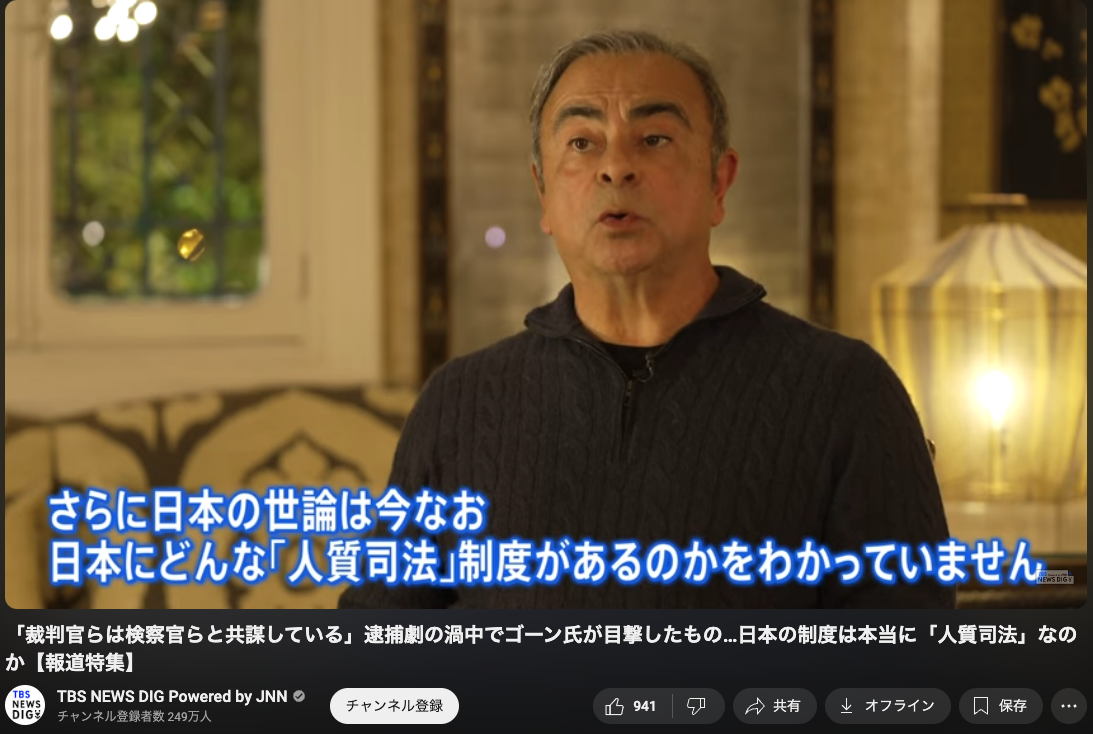Introduction
Carlos Ghosn: “Without any doubt, I was a hostage. Who held me hostage? Well, a group of people—prosecutors, the special division of the Tokyo prosecutors, and a few executives in Nissan who colluded to orchestrate my arrest.”
The conflict surrounding the Nissan-Renault-Mitsubishi alliance led Nissan executives to use the prosecutors to remove Ghosn from power, rather than seeking a fair vote for his dismissal.
Interviewer: “Why was Asahi Shimbun the only newspaper able to take your photo at Haneda Airport? Was it because the prosecutors leaked the information to them beforehand?”
Ghosn: “Yeah, without any doubt. Without any doubt.”
This significant question about how only Asahi Shimbun managed to outmaneuver others and take the photo is covered quickly in the 30-minute interview, but it reveals the close relationship between power and the media. The media, which is subservient to power, labels Ghosn as guilty, leading the public to firmly believe that Carlos Ghosn is indeed guilty.
Gohara also points out the collusion between the media and the authorities. A particularly troubling phrase he mentions is:
“Arrest first, gather evidence later.”
This is the standard practice of Japanese investigative agencies. Let’s break it down once more:
- In Japan, suspects are arrested and detained for long periods without access to a lawyer (detained until they break).
- Surrounding people are pressured with the fact that someone has been arrested, leading to further confessions.
- The media is used to sway public opinion in favor of the authorities.
Simply calling it “hostage justice” might not resonate with those who aren’t paying attention, but the above three points define what it means to be a “hostage.”
My case may be much smaller in scale compared to Ghosn’s, but I can assert that the same structure was at play. It wasn’t the prosecutors and media, but the police and media working together in a way that threatens democracy by using power to manipulate the media. It’s time we realize this.
Around 12:50 into Ghosn’s interview, he says:
When I was in Japan, I asked a question: how many years would it take for me to be tried? My lawyers told me that because the judge wanted to make the trials consecutive rather than together—since there were many charges—they said I was going to have 8 to 9 years of trials. Okay, 8 to 9 years of trials.
Then I said, “And during this period, if you remember, I could not talk to my wife, I could not see my wife, I could not have some of my children visiting me.” So, the perspective of staying 8 to 9 years in Japan without being able to talk to my wife, see my wife, or see some of my children was too much. I was a hostage. I was a hostage not only of the prosecutor but also of the judge who accepted this very harsh condition for somebody who is still innocent until proven guilty.
So, I was treated during this period as if I were already guilty. I could not accept that.
This method of establishing guilt through arrest is what “hostage justice” entails. Once the decision to arrest has been made, there’s no turning back, and the darkness lies in the fact that the arrest is often made without full consideration, with the investigation proceeding recklessly.
In essence, it’s a terrifying process where incidents are manufactured through power struggles, hostages are taken, and a scenario that suits those in power unfolds. Cases involving wrongful death sentences, like the Hakamada case or the Daikyo Chemical incident, where the suspect died in custody, are said to have arisen from power struggles.
The power structure and disregard for human rights within Japan’s judicial system have reached a critical point where the public themselves cannot recognize the problem. This is a condition that can only be addressed by receiving a lot of external criticism.
To be continued tomorrow.
人質司法 – カルロスゴーン
以下、冒頭
カルロスゴーン「Without any doubt I was a hostage. Who held me hostage well a group of people prosecutors the special division of the prosecutors of Tokyo with a few Executives in Nissan who collided to make this arrest(間違いなく人質司法にあった。誰がかと言えば、東京地検特捜部と何人かの日産の幹部である)」
日産・ルノー・三菱のアライアンスを巡っての対立があり、日産幹部は公正な投票ではなくゴーン氏の解任を狙うため、検察を利用した。
インタビューワー「なぜ朝日新聞だけが羽田空港であなた(ゴーン氏)の写真を撮ることができたのか?それは検察が事前に新聞社にリークしていたからではないか?」
ゴーン「Yeah, without any doubt. Without any doubt.(間違いなくそうだ、絶対に)」
朝日新聞だけが他を出し抜いて撮影に成功したというこの事実は約30分のインタビューであっさり終わっているがかなり重要な質問である。
権力とマスコミが密接な関係にあるということである。権力の言いなりになっているマスコミもゴーン氏が有罪だと烙印を押すので国民もすっかりカルロスゴーンは有罪だと信じ込む。
郷原氏もメディアの癒着について指摘しているが、とても気になった言葉が以下。
「逮捕してから証拠を集める」
これが日本の捜査機関の慣例なのである。もう一度整理する。
- 日本では、容疑者(被疑者)を逮捕し弁護士も付けないまま長期間勾留する(容疑者が屈服するまで勾留)
- 逮捕された容疑者の周辺に、逮捕者が出ているという事実を突きつけてさらに供述を取る
- メディアを利用して民意を味方に付ける
人質司法と一言で言ってしまうと関心のない方に響かないのかもしれないが、上記の3点が「人質」の意味なのである。
僕の事件はゴーン氏と比べて非常に小さいが、全く同じ構図が存在したと断言する。検察とメディアではなく、警察とメディアという関係ではあったが権力がメディアを利用する構図が民主主義の脅威になっているとそろそろ気づいた方がいい。
ゴーン氏インタビュー12:50あたりであるが
私は日本にいた際
自分の裁判は何年かかるのかと質問しました(中略)裁判は8年から9年に及ぶだろうと言っていました。(中略)私は妻と話をすることも会うこともできません 子どもの面会も認められません
妻と話をし 会うこともできず 子どもたちにも会えないまま日本に8年から9年留め置かれると考えるとやり切れない思いになりました
私は人質だったのです(中略)検察にとっても裁判官にとっても人質でした。(中略)
有罪が確定するまでは 推定無罪であるはずの人間に対するこうした非常に厳しい条件を受け入れた裁判官の(人質)です わかりますか
つまり私はその間 すでに有罪の人間であるかのように扱われました
いいですか? 私は そんなことは受け入れられませんでした
逮捕して有罪を確立させる手法が人質司法なのである。もう逮捕という決断をしてしまったら後には引き返せない様子は想像しやすいが、見切り発車で逮捕してしまうところに闇がある。
つまりそれは、権力闘争により事件がまず作られ人質が生まれ権力の都合の良いシナリオが進行していくというとても恐ろしいことだ。袴田氏の死刑冤罪事件や大河原化工機の被疑者死亡冤罪事件など、人命に関わる事件も権力闘争の末に生まれた事件だと言われている。
日本の司法に関する権力構造と人権軽視の体質は、国民自身が気づけないという末期の病のような症状となっている。これは、海外からたくさんの指摘を受けなければ快方しない。



Comments